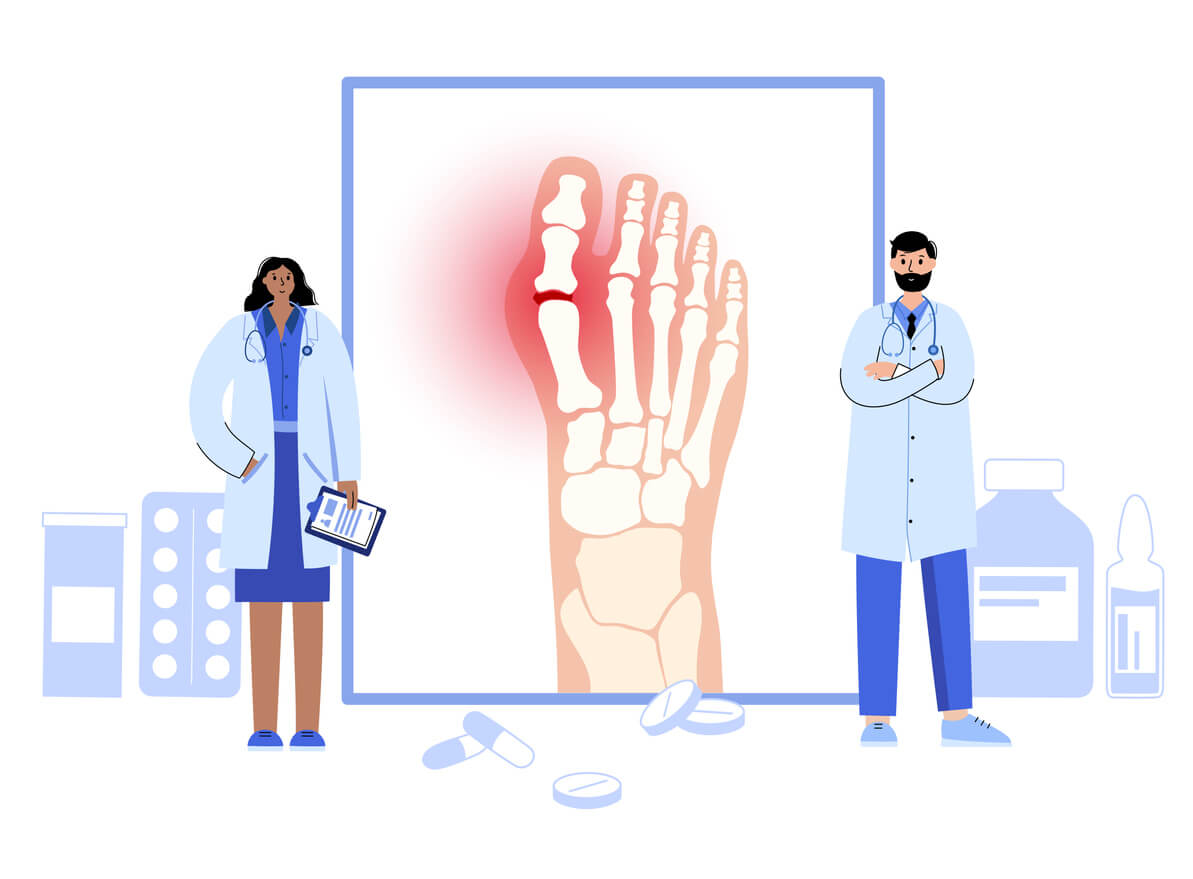What is a bunion?
The exact cause of bunions is unknown. However, it is related to joints in the foot and big toe becoming less stable. This leads to the classic change in foot shape.
Bunions can run in families and people with underlying conditions, including having a flatfoot deformity or rheumatoid arthritis, may also be more prone to developing bunions. Foot injuries and wearing very tight/narrow shoes may also put you at risk of developing bunions.
Because the carpal tunnel has tight boundaries, anything that causes swelling or narrowing can raise pressure within it. Pressure on the median nerve leads to the symptoms of carpal tunnel syndrome.

How are bunions diagnosed?
A qualified healthcare professional such as your doctor, podiatrist or physiotherapist can make the diagnosis. They will ask you some questions about your symptoms, such as how they started and how they affect your daily life.
They will look at your foot to check for the typical signs of bunions. Your doctor might arrange an X-ray of your foot, as well as blood or other laboratory tests to check for underlying conditions. They might send you to an orthopaedic specialist for an expert opinion and guidance with treatment decisions.
Bunion treatment
The goal of treatment for bunions is to relieve pain and help you get back to your everyday life, work, and leisure activities. As with all conditions, there are non-operative and operative options for treating bunions.
Non-surgical treatment for bunions
The first line of treatment usually involves choosing good footwear. Look for shoes with a wide, deep toe box (such as a trainer or jogger) which will accommodate the deformity. Steer away from high-heeled shoes with pointy toes, which put more pressure onto the painful area.
Other ways to ease bunion pain include:
Going barefoot when possible.
Using toe spacers, splints or cushioning bunion pads.
Taping or strapping your foot/toe.
Wearing orthotics (shoe inserts).
To ease pain and inflammation associated with bunions, your doctor might advise:
Taking anti-inflammatory medications.
Having a cortisone injection.
Using ice packs or heat on the bunion.
Achieving a healthy weight to take pressure off the joints in your feet.
Bunion surgery
Bunion surgery might be advised if conservative measures don’t work, or if your foot is very deformed or painful.
Surgery for bunions aims to realign the big toe. Most commonly, surgery involves cutting the bones of your big toe, or performing osteotomies, to straighten out the toe. If the deformity is severe or significant arthritis is present, your doctor might recommend joint fusion surgery.
Bunion surgery might be done using a keyhole procedure or a traditional open technique. If you have bunions on both feet, it is reasonable to have both sides operated on at the same time to minimise your recovery period. Modern bunion surgery is highly effective with good outcomes. Your doctor can answer your questions and discuss which type of bunion surgery might be best for you.
How long does it take to recover from bunions?
Many people with bunions learn to live with them by making lifestyle changes like wearing suitable shoes.
You will usually stay overnight in hospital following your bunion surgery. Depending on the technique, you may be able to start bearing weight straight away wearing a special post-operative shoe. Some people might need a short period of immobilisation with no weight bearing.
You will usually need to wear a stiff-sole special shoe for six weeks, with a progressive return to full weight bearing and movement. Most people are reasonably comfortable walking in normal supportive shoes by 6 months, but it can take up to a year for full recovery from your surgery.
References
https://orthoinfo.aaos.org/en/diseases--conditions/bunions/
https://www.healthdirect.gov.au/bunion
Reviewed by Mr
Wei-Han Tay, Orthopaedic Surgeon at Holmesglen Private Hospital and Northpark Private
Hospital.
Our Hospitals
Find out more about the orthopaedic services at our hospitals.
NSW
Campbelltown Private Hospital
Hunter Valley Private Hospital
Nepean Private Hospital
Newcastle Private Hospital
Northern Beaches Hospital
Norwest Private Hospital
Prince of Wales Private Hospital Sydney Southwest Private Hospital
QLD
Brisbane Private Hospital
Gold Coast Private Hospital
Peninsula Private Hospital
Sunnybank Private Hospital
Contact Us
Need further assistance? For general queries on orthopaedic services at Healthscope, please contact us below. We're here to help.



